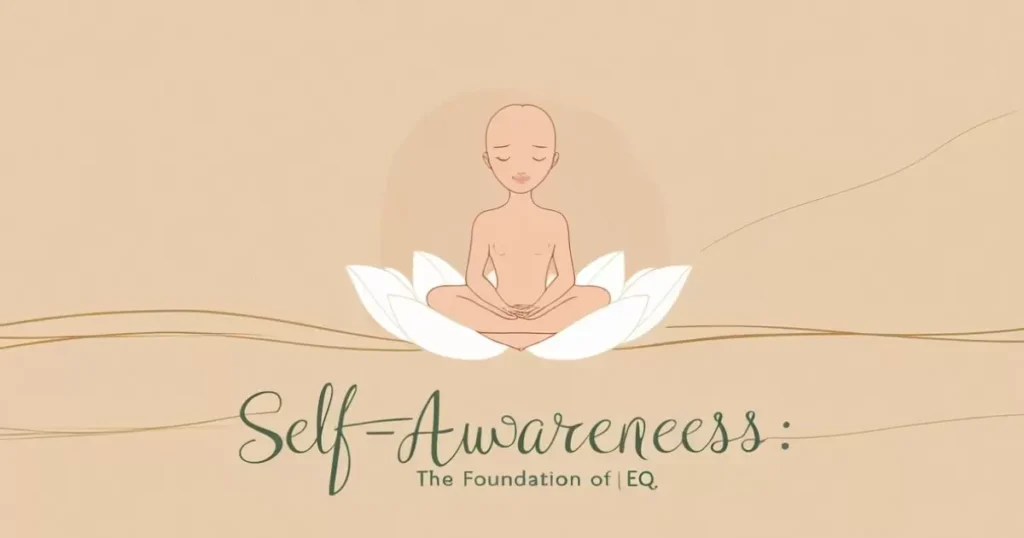
Ever wondered why some people seem to navigate life’s ups and downs with ease, while others struggle? The secret might lie in emotional intelligence (EQ). This often-overlooked skill set can be your ticket to happier relationships, a more fulfilling career, and overall life satisfaction. Let’s dive into the world of EQ and discover how you can harness its power.
What Is Emotional Intelligence?
Emotional intelligence is the ability to recognize, understand, and manage our own emotions, as well as the emotions of others. It’s about being aware of feelings – both your own and those of the people around you – and using this awareness to guide your thoughts and actions.
Think of EQ as the bridge between your heart and your head. It’s what helps you:
- Keep your cool during a heated argument
- Motivate yourself to push through challenges
- Empathize with a friend who’s going through a tough time
- Navigate complex social situations with grace
The Five Components of Emotional Intelligence
Psychologist Daniel Goleman, who popularized the concept, breaks EQ down into five key components:
- Self-awareness: Recognizing your own emotions and their effects
- Self-regulation: Managing your emotions and impulses
- Motivation: Using your emotions to achieve goals
- Empathy: Sensing and understanding others’ emotions
- Social skills: Managing relationships and building networks
Let’s explore each of these in more depth.
Self-Awareness: The Foundation of EQ

Self-awareness is like having a personal emotional GPS. It’s about tuning into your inner world and understanding what makes you tick. When you’re self-aware, you can:
- Identify your emotional triggers
- Recognize how your feelings impact your behavior
- Understand your strengths and weaknesses
Boosting Your Self-Awareness
Try these exercises to sharpen your self-awareness:
- Keep an emotion journal: Write down your feelings throughout the day and what caused them.
- Practice mindfulness: Take a few minutes each day to sit quietly and observe your thoughts and feelings without judgment.
- Ask for feedback: Reach out to trusted friends or colleagues for their honest perceptions of you.
“Knowing yourself is the beginning of all wisdom.” – Aristotle
Self-Regulation: Mastering Your Emotions
Self-regulation is all about staying in control of your emotions, rather than letting them control you. It’s not about suppressing feelings, but managing them effectively. People with strong self-regulation skills:
- Remain calm under pressure
- Adapt easily to change
- Think before they act
Techniques for Better Self-Regulation
- Practice deep breathing: When emotions run high, take slow, deep breaths to calm your nervous system.
- Use the “pause” technique: Before reacting, pause and count to ten. This gives you time to choose your response.
- Reframe negative situations: Look for the silver lining or learning opportunity in challenging circumstances.
| Emotion | Self-Regulation Technique |
| Anger | Count to ten, take deep breaths |
| Anxiety | Practice progressive muscle relaxation |
| Sadness | Engage in a mood-boosting activity |
Motivation: Harnessing Emotions for Success

Emotionally intelligent people are masters at using their emotions as fuel for achievement. They’re driven by internal motivators like personal growth and a sense of purpose, rather than external rewards.
Tips for Boosting Your Motivation
- Set meaningful goals: Align your objectives with your values and passions.
- Visualize success: Regularly imagine yourself achieving your goals.
- Celebrate small wins: Acknowledge and reward your progress along the way.
Case Study: The Power of Intrinsic Motivation
Sarah, a software developer, was feeling burnt out at her job. Instead of quitting, she tapped into her emotional intelligence. She realized her lack of motivation stemmed from feeling unchallenged. Sarah approached her manager about taking on more complex projects that aligned with her passion for AI. This shift reignited her enthusiasm, leading to increased productivity and job satisfaction.
Empathy: Walking in Others’ Shoes
Empathy is the ability to understand and share the feelings of another. It’s a crucial component of emotional intelligence that helps build strong relationships and fosters a more compassionate world.
Developing Your Empathy Skills
- Practice active listening: Focus on understanding the other person’s perspective without interrupting or judging.
- Read fiction: Studies show that reading literary fiction can improve empathy.
- Volunteer: Helping others in need can broaden your perspective and increase empathy.
“Empathy is seeing with the eyes of another, listening with the ears of another, and feeling with the heart of another.” – Alfred Adler
Social Skills: Building Stronger Connections
The social skills component of EQ is about managing relationships effectively. It encompasses a wide range of abilities, from communication to conflict resolution.
Key Social Skills to Develop
- Clear communication: Express your thoughts and feelings clearly and assertively.
- Conflict resolution: Address disagreements constructively and find win-win solutions.
- Leadership: Inspire and guide others towards a common goal.
- Teamwork: Collaborate effectively with diverse groups of people.
Strategies for Improving Social Skills
- Join a club or group: Regular social interaction can help you practice and refine your skills.
- Take a public speaking course: This can boost your confidence in expressing yourself.
- Practice giving and receiving feedback: Learn to offer constructive criticism and accept feedback graciously.
The Impact of Emotional Intelligence in Various Life Domains
EQ in the Workplace
Emotional intelligence can be a game-changer in your professional life. Here’s how:
- Better leadership: Leaders with high EQ inspire and motivate their teams more effectively.
- Improved teamwork: Emotionally intelligent employees collaborate more smoothly and resolve conflicts more easily.
- Enhanced customer service: Understanding and managing emotions leads to better customer interactions and satisfaction.
Interesting Fact: A study by TalentSmart found that emotional intelligence is the strongest predictor of performance, explaining 58% of success in all types of jobs.
EQ in Personal Relationships
Emotional intelligence can significantly improve your personal relationships:
- Deeper connections: Understanding and empathizing with others leads to more meaningful relationships.
- Better communication: EQ helps you express your needs and understand others’ perspectives more clearly.
- Conflict resolution: Emotionally intelligent people can navigate disagreements more constructively.
EQ and Mental Health
There’s a strong link between emotional intelligence and mental well-being:
- Stress management: People with high EQ are better equipped to handle stress.
- Resilience: Emotional intelligence helps you bounce back from setbacks more easily.
- Self-esteem: Understanding and accepting your emotions can boost self-confidence.
Measuring Emotional Intelligence
While EQ isn’t as straightforward to measure as IQ, there are several assessments available:
- Mayer-Salovey-Caruso Emotional Intelligence Test (MSCEIT): A performance-based test that measures how well people perform tasks and solve emotional problems.
- Emotional and Social Competency Inventory (ESCI): A 360-degree assessment that gathers feedback from peers, managers, and direct reports.
- Trait Emotional Intelligence Questionnaire (TEIQue): A self-report measure that assesses emotional self-perceptions.
Developing Your Emotional Intelligence

The good news is that emotional intelligence can be improved with practice. Here are some strategies to boost your EQ:
- Practice self-reflection: Regularly set aside time to examine your thoughts, feelings, and behaviors.
- Seek feedback: Ask trusted friends or colleagues for honest input on your emotional strengths and weaknesses.
- Read widely: Explore books on psychology, philosophy, and personal development to gain new perspectives.
- Try new experiences: Stepping out of your comfort zone can increase your emotional range and understanding.
- Meditate: Regular meditation can improve self-awareness and emotional regulation.
A 30-Day EQ Challenge
Ready to take your emotional intelligence to the next level? Try this 30-day challenge:
| Day | Activity |
| 1-5 | Keep an emotion journal |
| 6-10 | Practice active listening in all conversations |
| 11-15 | Perform one random act of kindness daily |
| 16-20 | Try a new stress-management technique each day |
| 21-25 | Give genuine compliments to three people daily |
| 26-30 | Reflect on your progress and set EQ goals for the future |
The Future of Emotional Intelligence
As we move further into the 21st century, emotional intelligence is becoming increasingly recognized as a crucial skill. Here’s what the future might hold:
- EQ in education: More schools are incorporating emotional intelligence training into their curricula.
- AI and EQ: As artificial intelligence advances, there’s growing interest in developing emotionally intelligent machines.
- EQ in the workplace: Companies are placing greater emphasis on emotional intelligence in hiring and promotion decisions.
FAQS
Was Lil Tay really in a car accident?
No, there’s no credible evidence that Lil Tay was involved in a car accident. The rumors appear to be false.
Where did the car accident rumors originate?
The rumors spread rapidly on social media platforms, particularly TikTok and Twitter, but the exact source is unclear.
How did Lil Tay respond to the accident rumors?
Lil Tay’s official accounts haven’t directly addressed the car accident rumors. Her last verified public statement was in 2023 regarding her return to social media.
Why do false rumors about celebrities like Lil Tay spread so quickly?
Social media’s rapid information sharing, combined with people’s fascination with celebrity news and the lack of fact-checking, often leads to the quick spread of unverified information.
How can fans verify news about Lil Tay in the future?
Always check Lil Tay’s official social media accounts or reputable news sources for accurate information. Be skeptical of unverified claims, especially those circulating only on social media.
Conclusion: Your EQ Journey Starts Now
Emotional intelligence is not just a buzzword – it’s a powerful set of skills that can transform your life. By developing your EQ, you’re investing in better relationships, improved mental health, and greater personal and professional success.
Remember, enhancing your emotional intelligence is a lifelong journey. Be patient with yourself, celebrate small victories, and keep practicing. With time and effort, you’ll unlock the full power of your emotions, leading to a richer, more fulfilling life.
Are you ready to start your EQ journey? Which aspect of emotional intelligence do you want to work on first? Share your thoughts and experiences in the comments below!




